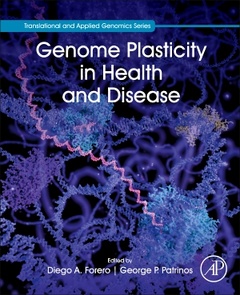Genome Plasticity in Health and Disease Translational and Applied Genomics Series

Genome Plasticity in Health and Disease provides a fully up-to-date overview on genome plasticity and its role in human physiology and disease. Following an introduction to the field, a diverse range of chapters cover genomic and epigenomic analysis and the use of model organisms and genomic databases in studies. Specific molecular and biochemical mechanisms of genome plasticity are examined, including somatic variants, De Novo variants, founder variations, isolated populations dynamics, copy-number variations, mobile elements, DNA methylation, histone modifications, transcription factors, non-coding RNAs, telomere dynamics and RNA editing.
Later chapters explore disease relevance for cancer, as well as cardiovascular, neuropsychiatric, inflammatory, and endocrine disease, and associated pathways for drug discovery.
1. Impact of Genome Plasticity on Health and Disease
Section I. Plasticity of the Human Genome2. Overview of the Human Genome3. Methods for Epigenomic Analyses: DNA Methylation4. Genomic Databases5. Genomic Variability: Germline, Somatic and de novo Variants6. Founder Variations in Isolated Populations7. DNA Methylation8. Chromatin, Histones and Histone Modifications in Health and Diseases9. Networks of Transcription Factors10. Centromere and Telomere Dynamics in Humans
Section II. Human Genome Plasticity and Diseases11. Genome Plasticity and Cardiovascular Diseases12. Genome Plasticity and Neuropsychiatric Disorders13. Genome Plasticity and Endocrine Diseases14. Implications of Genome Plasticity for Drug Development
- Examines the role of genome plasticity across a range of disease types, from cardiovascular disease, to cancer and neuropsychiatric disorders
- Adopts an interdisciplinary approach, with expert contributions across the spectrum of basic science and disease relevance to drug discovery
Date de parution : 04-2020
Ouvrage de 288 p.
19x23.3 cm
Mots-clés :
human genomics; genomics; genome plasticity; 3D genome; human genome; model organisms; genome analysis; epigenomic Analyses; genomic databases; genome Plasticity in health and disease; somatic Variants; De Novo variants; founder variations; isolated Populations; copy-Number Variations; mobile elements of the human genome; DNA methylation; histone modifications; networkstranscription factors; non-coding RNAs; telomere Dynamics; RNA editing; genome plasticity and cardiovascular disease; genome plasticity and neuropsychiatric disorders; genome plasticity and cancer; genome plasticity and inflammatory disease; genome plasticity and endocrine disease



